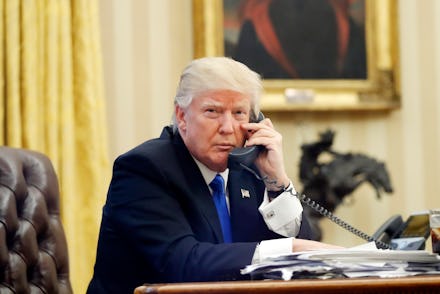The volatile call between Trump and Australia's PM: What does it mean for international relations?

Startling details of a Saturday phone call between Australian Prime Minister Malcolm Turnbull and U.S. President Donald Trump are now being widely circulated by both U.S. and Australian news outlets.
During the call, Trump is reported by the Washington Post to have declared the conversation the "worst" he'd had that day and suggested that an existing agreement for refugee resettlement in the U.S. was the result of Turnbull trying to send the U.S. the "next Boston bombers."
Trump is also said to have ended the conversation with the prime minister a mere 25 minutes into the call, which was scheduled to last a full hour.
What happened, and is the U.S. about to lose a historic ally?
Trump violated historic precedent of close Australian ties
President Barack Obama enjoyed a close relationship with Turnbull, keeping with the historically strong relationship between the U.S. and Australia. The countries have shared intelligence and coordinated on military action, in addition to providing their mutual diplomatic support.
Despite occasional diplomatic disagreements, U.S. presidents have shown consistent support for Australia, with Richard Nixon being the notable exception.
Australian media has responded with increased U.S. skepticism. The popular Sydney Morning Herald ran an op-ed encouraging Australians to "wake up" and stop relying heavily on the alliance with the U.S.
The Australian government is in damage control mode, trying to combat reports of Trump hanging up on Turnbull, despite the myriad reports making the claim.
Trump demonstrates ignorance of Australian deal he criticized
The U.S. president is reported to have repeatedly misstated the terms of the agreement between the Obama administration and the U.S., placing the proposed number of refugees to be resettled in the U.S. at 2,000. The actual number is 1,250, a fact Turnbull is said to have told Trump multiple times.
Trump also is said to have accused the PM of trying to send the next "Boston bombers." Aside from the inflammatory nature of the claim, one of the bombers was actually an American citizen and neither were from Iran, the country from which the vast majority of refugees involved in the resettlement deal hail.
The agreement with Australia, contrary to Trump's statements that the refugee resettlement deal is the "worst deal ever," is not controversial or partisan. Sen. John McCain (R-Ariz.), chairman of the Senate Committee on Armed Services, announced on Twitter that he'd personally called the Australian ambassador to reassure him that he fully supported the current U.S.-Australian alliance.
Per McCain's statement:
I called Australia’s Ambassador to the United States this morning to express my unwavering support for the U.S.-Australia alliance. I asked Ambassador Hockey to convey to the people of Australia that their American brothers and sisters value our historic alliance, honor the sacrifice of the Australians who have served and are serving by our side and remain committed to the safer, freer and better world that Australia does far more than its fair share to protect and promote.
Speaker of the House Paul Ryan (R-Wisc.) also told reporters, "I know Prime Minister Turnbull. He was in my office a couple months ago. He is a very important ally. Australia is a very central ally. They are and will continue to be."
Rex Tillerson to the rescue - maybe
Controversial ex-CEO of ExxonMobil Rex Tillerson began his tenure as U.S. secretary of state Wednesday. He struck a measured, conciliatory tone during his initial words to the State Department, a marked shift from the combative Twitter diplomacy of President @realDonaldTrump.
Tillerson has rejected Trump's suggestions that other nations should consider nuclear armament, expressed support for NATO and the TPP, spoken against the targeting of Muslims and described the Russian invasion of Ukraine as illegal.